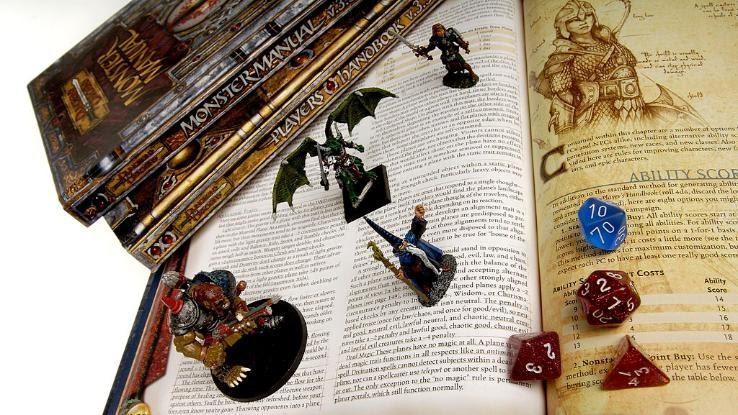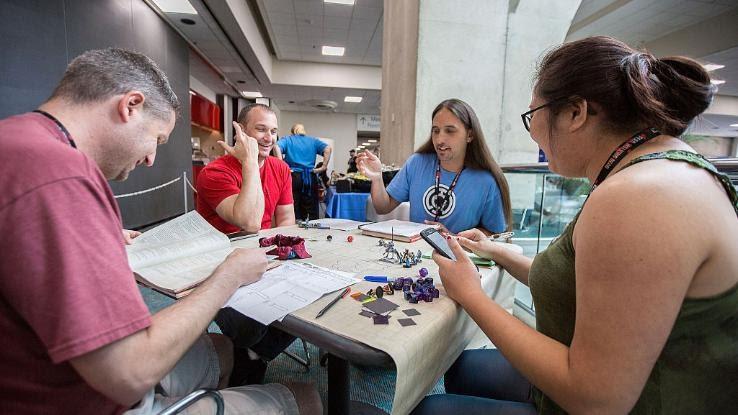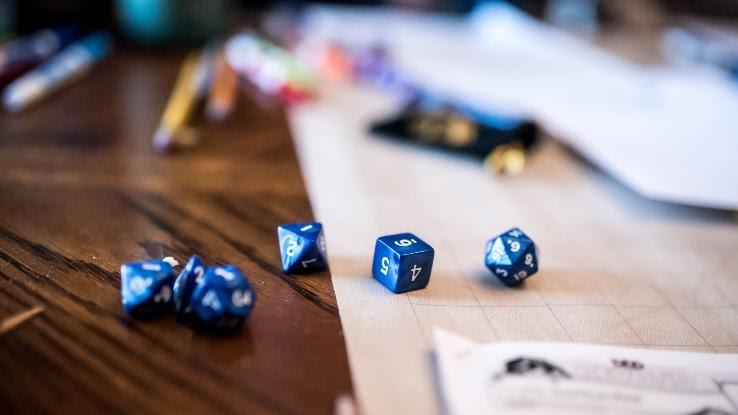
Dungeons and Dragons has become so popular that pretty much everyone has heard of it, even if they’ve never actually played it. The popular role-playing game (RPG) first made its debut almost 50 years ago, back in 1974, and has since become one of the most — if not the most — popular tabletop fantasy games in the world.
These days, you can even play D&D online and connect with other players over popular chat platforms like Discord. If you’re curious to know what the game is all about — and how it has managed to stay popular for so long — join us for a crash course, Dungeons and Dragons 101.
The Humble Origins of the World’s Most Epic RPG
The revolution that would eventually become Dungeons & Dragons owes its origins to a fateful meeting between two war-game fans named Gary Gygax and Dave Arneson. It all began with an earlier game called Chainmail, which was written by Gary Gygax and a friend of his, Jeff Perren. Chainmail was a medieval-themed combat game and included a 14-page write-up that detailed how players could incorporate fantasy elements into the gameplay.
Chainmail made its way to Dave Arneson, who decided to use the fantasy rules section to develop a game of his own, Blackmoor. By combining the elements of Chainmail and several other games, Arneson developed a Lord of the Rings-style game universe where players could engage in epic battles as they explored underground dungeons and vast lore.

In 1972, Arneson introduced Gygax to Blackmoor — and he was immediately blown away. Ultimately, Arneson and Gygax formed a partnership and developed a new game: Dungeons & Dragons. The RPG was first distributed in 1974 by Tactical Studies Rules (TSR), a company that Gygax formed himself after struggling to find a publisher.
That year, the first 1,000 copies of the D&D box set — most of which were hand-assembled — sold for $10. Eventually, Dungeons & Dragons became more than just an innovative, fantasy-fueled idea, exploding into a bonafide phenomenon. As a result, TSR was purchased by Hasbro’s Wizards of the Coast, the game’s current publisher, in 1997.
What Makes D&D So Great, Anyway?
If you’ve never played Dungeons & Dragons yourself, you may have found yourself wondering what all the hype is about. This tends to be especially true given the notorious enthusiasm for the game that D&D tends to inspire among its fans. So, how exactly does Dungeons & Dragons work, and, in a world full of tabletop games and RPGs, why has it endured for nearly 50 years?

One of the key reasons for D&D’s popularity? It hinges on imagination. No matter how old you may be, the game invites you to partake in an epic exercise in make-believe, one that features heroes, monsters, battles, and plenty of adventure. Unlike the average game of make-believe, however, D&D provides just enough framework, so that every game is not only structured, but equal parts chance and strategy.
When you start the game, you invent a character and take on their role. You can choose to become a fighter, a wizard, a cleric, or a rogue, for example. Part of the fun? Creating a whole personality, appearance, set of skills, and backstory for the character you decide to play. Using a combination of character sheets, the Player’s Handbook. and your own imagination, the possibilities are nearly endless.
One player takes on the role of the Dungeon Master, the person responsible for running the game and keeping the story on track. By using an adventure book, the Dungeon Master can lead the players (and their characters) through a variety of storylines, leaving each player to decide on their reaction to the circumstances that arise. As you may know, a dice-throwing system is used to determine whether the player’s strategy turns out to be a success or failure, thus emphasizing that great balance of chance and strategy.
An Endless World of Adventure
“Why did it catch on so quickly? Because it offered almost pure escapism and the ability, in the game, to do anything and everything you wanted to do!” Arneson once said in Different Worlds. “Gads! Who wouldn’t get hooked on game-playing nirvana like that after years of charts, tables, painting figures, etc.”
In an industry that had previously been composed of games played with miniature figurines, Dungeons & Dragons offered players the chance to use their creativity like never before. By relying heavily on the imagination and contributions of each player, the game more or less offered players the chance to write their own fantasy epic.

Take, for example, Robert Wardhaugh, a player who started a game of D&D as a teenager in 1982. As of 2020, the game is still going, which means it has lasted a whopping 38 years. Of course, not all D&D games last that long, but that’s part of the beauty of it all — it can be what you make it.
When you sit down to start your adventure, you can conjure up a fantasy scenario that plays out for as short or as long a period as you’d like. Nowadays, there are even whole leagues and conventions where D&D fans can connect to combine their creativity and produce more exciting adventures.
D&D Goes Digital
While it’s technically been possible to play Dungeons & Dragons online for some time, there was once a time when it was a bit more of a chore. Recently, however, the company has released more tools that make online gaming much easier. This became especially true during the COVID-19 pandemic, since players couldn’t gather in a physical space. Thanks to these online methods of connecting, the game enjoyed a 33% sales increase during 2020, with both new and veteran players alike gathering virtually for some solid escapism and fun.

The online option is also a great way for new players to get started. Instead of searching for players in your area, simply check out D&D Beyond, which has made online gameplay easier than ever before. There you’ll find a virtual character builder, free access to game rules, and even virtual dice-rolling capabilities. Additionally, the folks behind D&D have also created a handy beginners’ guide capable of teaching you everything you need to know so that you can create your character and embark on your first quest with ease.
As you’ll soon discover, a whole subculture has risen up around the world of Dungeons & Dragons over the years — and it doesn’t appear to be going anywhere. So, if you’re looking to meet new friends and flex your imagination, why not roll the dice?






